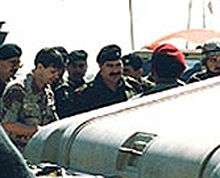Safwan
Safwan (Arabic: صفوان) is a town in southeast Iraq on the border with Kuwait. It was the site of an Iraqi Air Force base.

Etymology
Safwan is also an Arabic name for a boy.
History
During Muhammad's era
Muhammad ordered a Military expedition in Safwan. The expedition was ordered by Muhammad after he received intelligence that Kurz ibn Jabir al-Fihri rustled some grazing cattle belonging to Muslims. It occurred directly after the Invasion of Waddan in the year 2 AH of the Islamic calendar. The expedition was ordered by Muhammad after he received intelligence that Kurz ibn Jabir al-Fihri rustled some grazing cattle belonging to Muslims. Therefore, Muhammad directed about 70 Muslims, who chased him to Safwan, at the outskirts of Badr. But Kurz ibn Jabir al-Fihri managed to escape.[1][2][3]
Persian Gulf War
Safwan is located in the south of Iraq at Iraqi Kuwaiti border, along the infamous Highway of Death from the Persian Gulf War. The cease-fire negotiations between General Norman Schwarzkopf and the Iraqi delegation led by Lieutenant General Sultan Hashim Ahmad took place at Safwan airfield. Schwarzkopf's demand to hold the formal cease-fire negotiations in Iraqi territory led to the encounter between the 1st squadron, 4th Cavalry regiment (Quarterhorse) from Ft. Riley, Ks. of the U.S. 1st Infantry Division (Mechanized) and the Iraqi Republican Guard, known in military circles as The Ultimatum. This was detailed in the book Third Graders At War, as well as the book Road to Safwan.
See also
External links
Coordinates: 30°07′N 47°43′E / 30.117°N 47.717°E
References
- ↑ Al-Mubarakpuri, Saifur Rahman (2002), When the Moon Split, DarusSalam, p. 147
- ↑ Strauch, Sameh (2006), Biography of the Prophet, Darussalam Publications, p. 400, ISBN 978-9960-9803-2-4
- ↑ Hawarey, Dr. Mosab (2010). The Journey of Prophecy; Days of Peace and War (Arabic). Islamic Book Trust.Note: Book contains a list of battles of Muhammad in Arabic, English translation available here